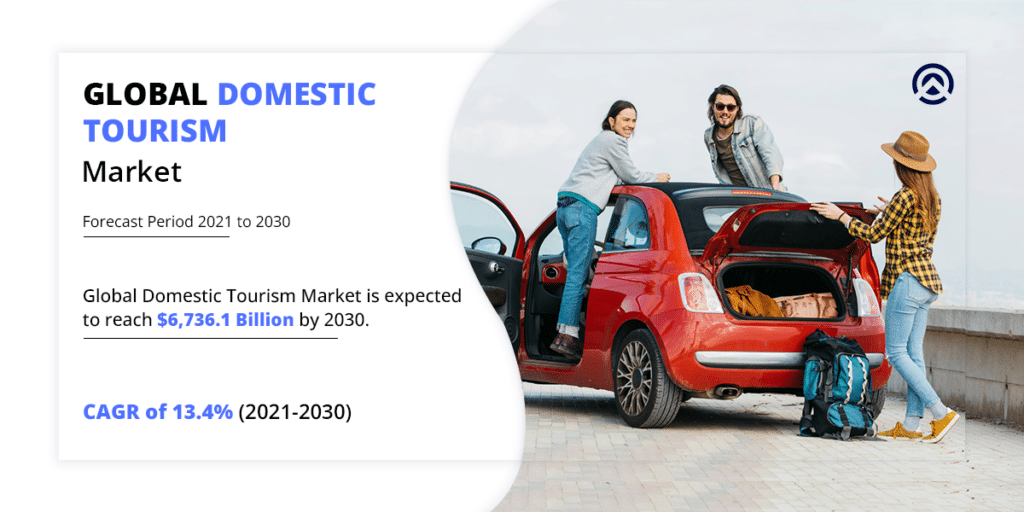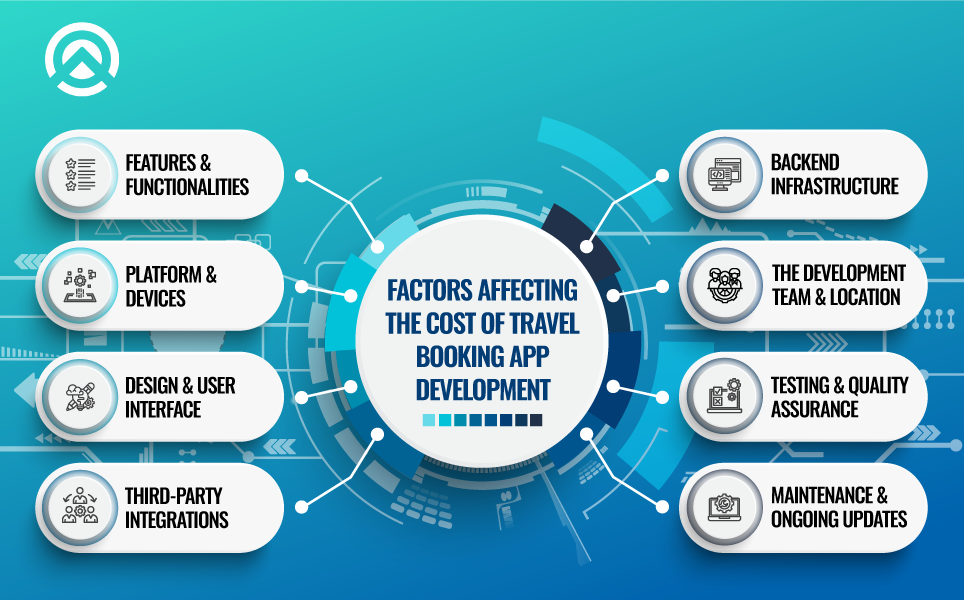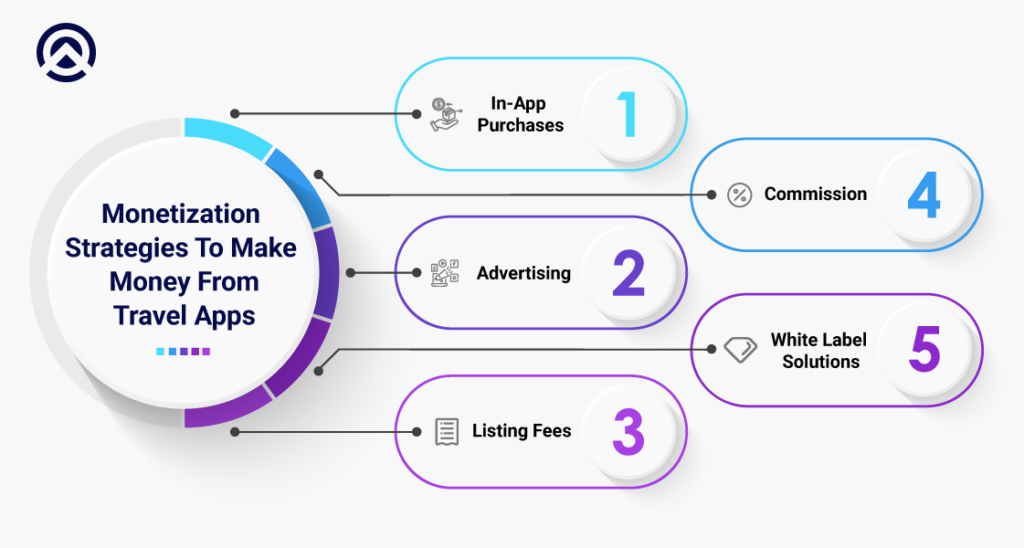What Factors Determine the Cost of a Travel Booking App Development?
Exploring unfamiliar locations & places always make people excited (irrespective of their) age groups. From childhood to old age, people tend to look for new destinations that they want to visit to enhance their experience. In reality, travel apps made the journey easier.
Travel apps play a significant role in supporting people by making their travel plans successful. Now, people tend to use mobile apps for various reasons – such as: booking tickets, booking hotels, preparing itineraries and more.

As per the data published by Allied Market Research, it is expected that the global domestic tourism market will be valued at $6,736.1 Billion by 2030. Although, it is forecasted that the global domestic tourism market will be going to increase at 13.4% CAGR from 2021 to 2030.
There is enough evidence that signifies the upward trend of the travel industry. So, if you have any travel & holiday app development ideas then continue to read out below information for getting verified insights related to cost factors.
Read more: Launching an MVP for a Boutique Travel Agency: Strategies for Success
Factors Affecting the Cost of Travel Booking App Development

Tourism & Holiday App Development costs get impacted due to various key factors. We have covered 8 key factors that are responsible for the development of travel booking applications. Overall, travel app developers can develop a basic travel application for less than $40,000 while the cost for a highly advanced travel app can cross up to $100,000.
1. Features & Functionalities
To make your travel application highly fascinating, you can choose to add these innovative features & functionalities such as: personalized recommendations, augmented reality (AR), voice assistants, travel itinerary management, social networking, travel insurance integrations and many more.
Expected Cost: $10,000 to $15,000.
2. Platform & Devices
The platform & device selection is also critical. Your cost can be impacted by the selection of a particular platform & device. Although, in order to minimize the cost while providing the best experience to your audiences we suggest our clients to give preference for cross-platform app development. You can hire full-stack developers for the development of a result-oriented mobile application.
Expected Costs:
- Native Apps (Android & iOS): $50,000 to $80,000.
- Cross-platform Apps: $25,000 to $50,000.
- Hybrid Apps: $20,000 to $75,000
3. Design & User Interface
| Design &UI Considerations | Explanation |
| Clean & Intuitive Design | Focus on the clutter-free design so that users can easily navigate from one screen to another. |
| Eye-Catching Visuals | Your images should captivate the user’s attention. |
| Interactive Maps & Location Services | It will assist users in finding location-based services. |
| Personalization & Recommendations | Provide relevant search results & options with personalized data to users. |
| Seamless Integration of Booking Details | The booking details should be easily organized within the app. |
| Consistent Branding | Enhance the visual identity & digital presence of your application at an optimum level. |
Expected Costs: $25,000 to $35,000
4. Third-Party Integrations
As there are common integrations that will help you in enhancing your customer experience.
- Payment Gateways: Integrating payment gateways like Stripe, PayPal, or Braintree allows users to make secure online payments for bookings.
- Mapping and Geolocation Services: Services like Google Maps, Mapbox, or HERE API can be integrated to provide location-based services, real-time navigation and map views for users.
- Flight and Hotel APIs: Integration with popular travel APIs such as Amadeus, Sabre, or Skyscanner enables real-time access to flight, hotel inventory, pricing, availability a nd booking functionality.
- Social Media Integration: Integrating social media platforms like Facebook, Twitter, or Instagram allows users to log in, share their travel experiences, and promote the app’s content.
- Push Notification Services: Services like Firebase Cloud Messaging (FCM) or OneSignal can be integrated to send personalized notifications about flight updates, booking confirmations, deals or relevant travel information.
- Reviews and Ratings: Integrating platforms like TripAdvisor, Yelp, or Trustpilot allows users to leave reviews and ratings for hotels, restaurants, or other travel services.
- Analytics and Tracking: Integrating analytics tools such as Google Analytics or Mixpanel helps track user behavior, measure app performance and gain insights for continuous improvement.
- CRM and Email Marketing Tools: Integration with customer relationship management (CRM) systems like Salesforce or email marketing tools like Mailchimp allows for effective customer management and targeted marketing campaigns.
5. Backend Infrastructure
The backend infrastructure of your application ensures how well you’ll be able to provide a fascinating customer experience. As, with the help of backend infrastructure you will be able to focus on server hosting, database management, scalability, third-party services and security measures with monitoring analytics. 3
Read More: 2023’s Best Bus Ticket Booking Apps
6. The Development Team & Location
For an excellent travel booking application you will require people for these roles – such as:
- Role 1: Project Manager.
- Role 2: UI/UX Designer.
- Role 3: Front-end Developers.
- Role 4: Back-end Developers.
- Role 5: Mobile App Developers.
- Role 6: Qa/Test Engineer
Now, here a question can arise in your mind – “how many specifically are UI designers or backend end developers do you need for your project?” To get an exact answer to this question, you can consult for free (30 mins free consultations) with our experts as a part of our travel app development services.
Expected Cost: You can incorporate outsourcing services from Amplework at $20/Hour to $25/Hour.
7. Testing & Quality Assurance
Before deployment, it is necessary to fulfill a final step i.e. testing and quality assurance. With this step, you can ensure that your mobile application is creating a streamlined experience for your customers.
8. Maintenance & Ongoing Updates
With testing & frequent quality assurance tests of your application – you can ensure that your users will not be going to jump into your competitor’s application. However, it is important that you should consistently focus on ensuring that your application should be completely free from bugs or errors. In such a case, Amplework can be a great choice because we offer free post-maintenance service for an application (till a certain time) to enhance our client satisfaction.
Expected Cost: Expected cost for website maintenance can be $5,500 per month.
Monetization Strategies To Make Money From Travel Apps

Once your idea is finalized then you need to connect with a travel app development company. They will evaluate your project requirements and you can ask for a result-oriented project roadmap for bringing a successful outcome.
For giving wings to your travel app development idea, first you need to make sure that your mobile application incorporates basic to advanced levels of functionalities (you can check out the above state information). Once all the functionalities are covered then you can add any of the below-listed monetization strategies to enhance your revenue.
1. While Label Solutions
White-label solutions are considered one of the excellent ways to monetize the mobile application. In this strategy, products or services are being sold by one company and others can use it under their brand name by paying a specific licensing fee. Once your application is created then you can offer it to 3rd parties for utilizing it with their own customizations.
2. Advertising
For advertising, you need to first conduct a target market segmentation. When you successfully evaluate your targeted audiences then you can showcase them advertisements as per their age or interest. After some time (probably 6 months or 12 months), once you will get the real-time customer data then you can sell them more personalized stuff.
3. Listing Fees
Travel applications come under the on-demand app development services and we suggest that you should keep your travel apps open for all hoteliers & companies to list their properties. However, if any more hostile or company demands to keep their hotels under the top search results then you can ask them to pay any specific listing fees.
Read More: How Metaverse Reshapes the Future of the Travel Industry?
4. Commission
You can partner with hotels, airlines or other travel agencies by asking them to pay a commission on every booking made through your application. This is one of the most common ways to monetize your application.
5. In-App Purchases
Your travel application can offer premium features or services within the app which can be purchased by your customers. For example: you can provide features like: access to exclusive deals, enhanced search options, priority customer support, consultation with travel experts, exclusive access to watch live streaming and many more.
The Final Words
To determine the exact cost of travel application development, it is important to consider the interest of your targeted audiences, app functionalities, market conditions and many more.
Combining multiple strategies helps in maximizing the revenue streams and it also provides an engaging user experience to attract & retain users. At Amplework, we offer best-in-class affordable travel app development solutions. We even offer 30 mins free consultations to all clients for discussing their project ideas.


 sales@amplework.com
sales@amplework.com
 (+91) 9636-962-228
(+91) 9636-962-228





